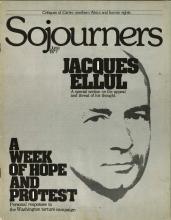Jacques Ellul puts the matter of prayer in the proper perspective for me. In his stimulating and insightful book Prayer and Modern Man, he says, "In the realm of prayer we can make no other claim than to obey." He reveals the hypocrisy of our usual rationale for prayer: to manipulate God and to procure for ourselves, or to produce some psychic peace in our depths.
He then turns us to the words of scripture and Jesus' command to "watch and pray." Prayer has very little to do with words, but rather is the reality of life lived in and through the living God as known in scripture. Ellul’s book states that it is a crucial matter of faith to choose that form of life in a doubting and cynical world, and to watch with hope for the coming of Jesus. Prayer rooted in the command and hope of scripture is the only way in which faith is maintained. The life of prayer is commanded for the disciple, not chosen.
Amen! It is exciting to read Ellul's bold statement about the absolute necessity of prayer in this day of vapid and saccharine writing on that subject. My concern is twofold. First, that we have become such activists that most of us have little time for prayer. We have lost the knowledge of the critical nature of prayer--that it is a matter of faith commitment and a demand that God not keep silent in our day.
I am also concerned about the lack of places to pray. Now this may sound strange to some, especially to Protestant ears. Why do we need a place to pray? We are comfortable with tossing off prayers as we rush through our current program, or engage in artful oratory before an audience--which we have been known to call pastoral prayer.
Read the Full Article

